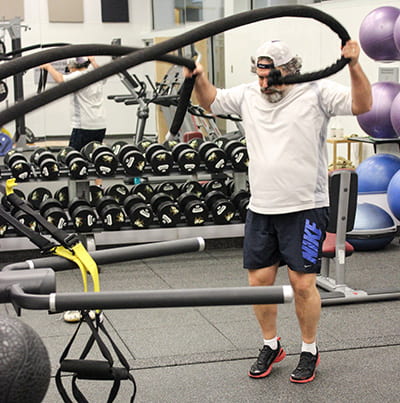We all want to see results ASAP. Unfortunately, results are usually a result of more incremental changes rather than drastic ones. So why is two weeks not enough  time to have a six pack?
time to have a six pack?
Generally speaking, obtaining a well-defined core is usually due to a combination of working out, being very diligent with your diet, and having great genetics. Here’s some things for you to concentrate on for the exercise portion of the equation.
Working Out
- Let’s say that the global definition of a six-pack is having muscle in your mid-section and having it be visible to the naked eye. If we get rid of fat on our mid-section but don’t have any muscle to show off, we still won’t have a six pack, so what we need first is to build muscle.
- To develop lean muscle mass, we need to perform movements that are challenging enough to recruit and fatigue the muscles that we are trying to “grow”. The rep range that research suggests is the best for muscle cell growth (hypertrophy) is anywhere from 8-15 reps. What determines the amount of reps you can do of a given exercise is load – the heavier the weight, the less repetitions you will complete before you cannot perform another. Therefore, if we are able to perform 100+ reps of an “ab” exercise before we can’t perform another repetition, we are not lifting in a range that will lead to muscle growth – we need more resistance!
Time and the Long-Term delayed training effect
- Exercise is an adaptive process and therefore anytime we stress our body, we need to allow time to recover and adapt to a given stressor. Said differently, whenever we do a workout, we won’t see the benefits or adaptations of that workout until a later date.
- Most training plans are built over weeks and months where specific changes are focused on. For muscle growth, the duration of those workouts may be 3-5 weeks. Taking the delayed training effect into account, when we’ve done two weeks of working out, we won’t see the benefit until perhaps two more weeks after (4 weeks after starting date).
In real-world application all this means is be patient. Change takes time even when you’re doing everything right. Consistency is key, so stick to your program and trust the process! Visit our website for our personal trainer bios and information on fitness program designs and individual and group personal training.
by Devin Clayton
Devin is a Bachelors of Physical Education graduate from the University of Alberta. He is a Certified Strength and Conditioning Specialist through the NSCA and is a NCCP certified Weightlifting coach.

